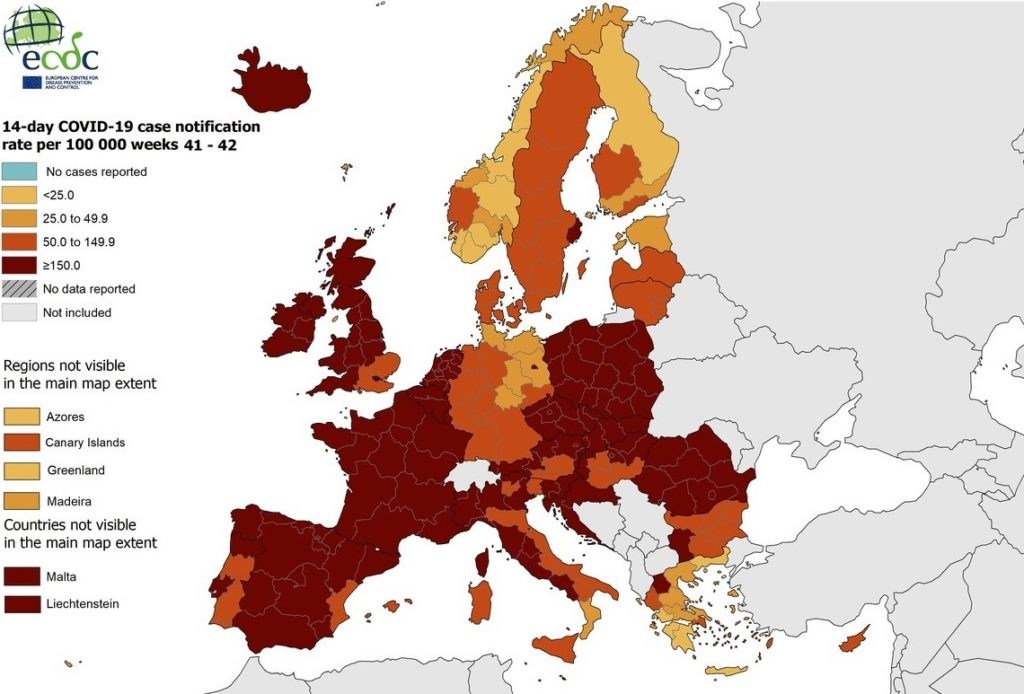The Commission announced today an additional set of actions to contain the pandemic which has hit the EU in a second wave more severe than the first one.
The announcement, which includes a Communication, comes ahead of the European Leaders' virtual meeting tomorrow (29 October) on COVID-19 coordination. If the coordination will be tightened then, the EU will break a record in swift decision-making.
Concretely, the measures aim to better understand the virus' spread and the effectiveness of the response, ramp up well-targeted testing, bolster contact tracing, improve preparations for vaccination campaigns, and maintain access to essential supplies such as vaccination equipment, while keeping all goods moving in the single market and facilitating safe travel.
“The rise in COVID-19 infection rates across Europe is very alarming,” said Stella Kyriakides, Commissioner for Health and Food Safety. “Decisive immediate action is needed for Europe to protect lives and livelihoods, to alleviate the pressure on healthcare systems, and to control the spread of the virus. Next month, we will present the first step towards a European Health Union.”
“In the meantime, Member States must improve cooperation and data sharing. Our EU surveillance system is only as strong as its weakest link. It is only by showing true European solidarity and working together that we can overcome this crisis. Together we are stronger.”
To improve the flow of information to allow informed decision-making, the Commission calls on Member States to provide all relevant data to the European Centre for Disease Prevention and Control (ECDC) and the Commission. The call does not include the candidate countries in the Western Balkans and Turkey although the EU is supporting them to fight the pandemic.
Testing is a decisive tool to slow down the spread of the coronavirus. To promote a common approach and effective testing, the Commission also issued a recommendation on COVID-19 testing strategies, including the use of rapid antigen tests.
It sets out key elements to be considered for national, regional or local testing strategies, such as their scope, priority groups, and key points linked to testing capacities and resources, and indications as to when rapid antigen testing may be appropriate. It also calls on Member States to submit national strategies on testing by mid-November.
To directly purchase rapid antigen tests and deliver them to Member States, the Commission is mobilising €100 million and is launching a joint procurement to ensure a second stream of access.
Where Member States are applying prior testing requirements to incoming travellers and where no testing capacities are available for asymptomatic travellers in the country of origin, travellers should be offered the possibility to undergo a test after arrival.
If negative COVID-19 tests are to be required or recommended for any activity, mutual recognition of tests is essential, in particular in the context of travel.
On contact tracing, the Commission writes that Member States, so far, have developed 19 national contact tracing and warning apps, downloaded more than 52 million times. In total, 17 national apps are currently based on decentralised systems and can become interoperable through the service in the coming rounds; others are in the pipeline.
The development and uptake of safe and effective vaccines is a priority effort to quickly end the crisis. Under the EU Strategy on COVID-19 vaccines, the Commission is negotiating agreements with vaccine producers to make vaccines available to Europeans and the world as soon as soon as they are proven safe and effective.
The Commission will put in place a common reporting framework and a platform to monitor the effectiveness of national vaccine strategies. (ECDC published on Monday recommendations on vaccine deployment.) To share the best practices, the conclusions of the first review on national vaccination plans will be presented in November 2020.
On communication, the Commission calls on all Member States to relaunch communication campaigns to counter false, misleading and dangerous information that continues to circulate, and to address the risk of “pandemic fatigue”.
Facilitating safe travel despite the pandemic continues to be a priority for the Commission. It refers to the recent recommendation adopted on 12 October by the Council for a common and coordinated approach to restrictions to free movement. “Any remaining COVID-19 related internal border control measures should be lifted,” according to the Commission.
Re-open EU provides timely and accurate information on health measures and travel restrictions in all Member States and some partner countries. The Commission calls on Member States to provide accurate and up-to-date information to turn Re-open EU into the one-stop-shop for information about health measures and travel possibilities across the EU.
The maps published by ECDC on the spread of COVID-19 cover only EU/EEA and UK. Asked by The Brussels Times why the candidate countries are excluded, a Commission spokesperson replied that the Commission is monitoring the epidemiological situation in those countries and referred to the ECDC and the Council for an explanation.
ECDC in its turn replied that it was not for the agency to decide on this and referred to the Council’s recommendation. That said, there is a framework for reporting on national surveillance data on mutually agreed diseases and the candidate countries do report COVID-19 data to WHO.
M. Apelblat
The Brussels Times

